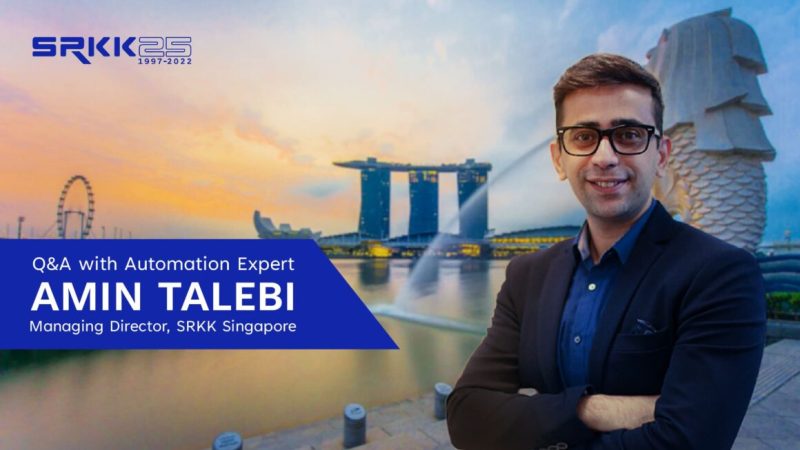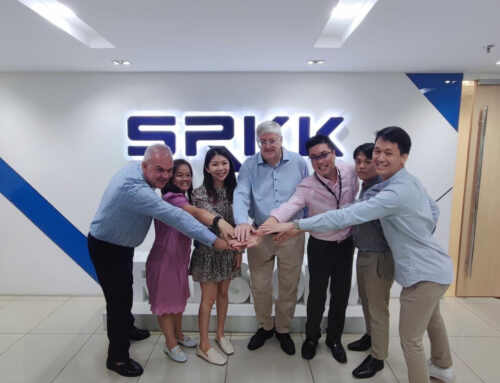
Q&A with Amin Talebi (Part 1):
Why businesses need RPA to thrive in the modern workplace?
Your customers are the most important part of your business!
To build customer relationships, many businesses are always looking for more time to be with customers. How do you create more time?
Automation!
To understand automation better, we had a special Q&A session with Amin Talebi, Managing Director of SRKK Singapore. Amin has 10 years of experience in implementing automation solutions for customers in Southeast Asia. He has led SRKK Singapore to two consecutive Nintex Solution Awards in 2020 and 2021.
In Part 1 of this session, he shares his perspective on why automation is needed in today’s modern workplace and what are the pitfalls to implementing RPA, etc.
Why do businesses in Singapore need automation today?
I think the way we work is starting to change not just with the evolution of technology. Like it or not, internal and external forces will also continue to press for a modern workplace.
That is to say, businesses must have a work environment that has implemented simple and automated processes, to speed up workflow and save cost, time and increase return on investment (ROI). It must also be able to adapt to the forces faced by businesses today.
A clear indication of this was the announcement of the 2022 Singapore Budget which emphasized technology and automation to encourage digitization capabilities and foster innovation.
What are the internal and external forces faced by Singaporean businesses today?
One internal factor is the new generation of employees that are looking for more purpose in their jobs, while another is manual and paperwork processes that slow down productivity.
External forces would be the competitive business environment and demand for quicker and high-quality customer service.
What are the benefits of automation?
Besides automating repetitive tasks, a resulting benefit is that it digitizes those workflows. It simplifies them. Processes that require tons of paperwork can be done digitally for greater efficiency, accuracy and compliance.
Your employees are saved from hours of daily auto-repeat functions that numb the mind. Instead, they are allowed to focus on more complex tasks that give them greater job satisfaction that help meet their goals.
With more time, employees can focus more time on your customers, while fast and accurate service as a result of automation will leave a long and lasting impression on customers when they think of your brand.
Quicker service delivery and stronger brand impressions will naturally increase your competitiveness in the market.
To further illustrate this point, we had a case study where a shipping company had to spend four hours daily to track and record incoming port shipments across different systems. This was followed by sending out emails to alert customers if their shipment has arrived early, on time or been delayed.
But with RPA, a software generated bot could access the different systems to compare the arrival times to generate reports on an excel sheets before sending out email alerts.
Is it expensive?
It depends on how you view costly, because you cannot overstate enough the opportunity costs. Employee satisfaction, digitizing workflows and better customer service are just the tip of the iceberg when it comes to automation.
A study by Deloitte stated that organizations which have implemented more than 50 automations have shown greater innovation in the way they tackle processes and workflows. These are changes that rethink the way an organization works. The way MNC’s run processes and workflows internationally.
But there are also smaller scale companies that have leveraged automation in their business to great effect.
By implementing automation, it digitizes processes that opens the door to more processes that can be automated for unmatched growth and rapid delivery.
How difficult is it to get started?
It is actually easy to implement with proven successful case studies showing that RPA can be executed within a week from ideation to implementation. However, it requires technical know-how and a well-thought-out roadmap.
In fact, it was within three days that we developed a breakthrough RPA solution with Nintex and Microsoft for the National Gallery of Singapore which registered 50,000 visitors in a month. The system is used till this day.
If you are already eager to learn more about automation and how you can get started for your business in Singapore, connect with us here for a free demo RPA Go Digital | SRKK
In Part 2, Amin will give us insights into the level of automation in Singapore today, the pitfalls to be aware of when implementing automation and how to overcome them. Stay tuned.

Amin Talebi
Managing Director, SRKK Consulting Pte. Ltd.
Passionate to transform client’s business processes from manual to digital, Amin is a highly experienced RPA and Modern Workplace consultant going back 10 years. With the ability to envision the success of his customers through automation, he has led SRKK Singapore to deliver solutions to clients that have been recognized internationally, such as National Gallery of Singapore and Busy Bees Asia for the impactful application of RPA.



